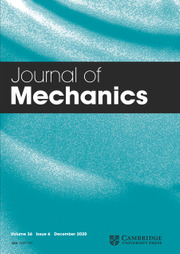Article contents
Two-Dimensional Dynamic Ground Effect on a Swimming Undulating Plate: A Parametric Study
Published online by Cambridge University Press: 04 September 2017
Abstract
The dynamic ground effect enhances the swimming of fish. The dynamic ground effect affects the kinematic conditions of fish, causing them to swim more efficiently. However, predicting the degree to which the dynamic ground effect can improve the swimming performance of fish is difficult. The dynamic ground effect can potentially save energy for biomimetic underwater vehicles. Therefore, a theoretical model was developed to investigate the effect of a planar boundary on the swimming performance of a two-dimensional undulating plate. General expressions for the thrust, power input, efficiency, and energy loss of the plate were obtained. As examples, cases in which an undulating plate with linearly varying amplitude swam far from and close to a wall under a range of different kinematic conditions were studied. The dynamic ground effect improved the swimming performance of the plate by reducing the power input while maintaining an almost constant thrust; the degree of improvement depended on the kinematic conditions of the plate. Furthermore, the swimming performance of the plate was improved over a range of distances from the wall; this range of distances also depended on the kinematic conditions of the plate.
Information
- Type
- Research Article
- Information
- Copyright
- Copyright © The Society of Theoretical and Applied Mechanics 2018
References
- 2
- Cited by

